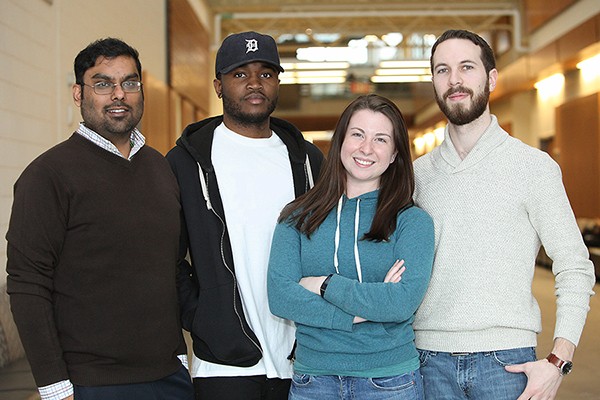 Deepaul Chunilall, Ted Thompson, Ryley Urban and Brande Norman placed second in the 2016 Industrial Engineering Case Competition.
Deepaul Chunilall, Ted Thompson, Ryley Urban and Brande Norman placed second in the 2016 Industrial Engineering Case Competition.
A team of UWindsor student engineers has devised a plan that can improve the efficiency of hospital porter services and enhance front-line care.
Third-year industrial engineering students Ryley Urban, Brande Norman, Deepaul Chunilall and Ted Thompson proposed a hardwired kiosk and swipe card system as a solution to inefficiency problems facing a hospital in Toronto as part of the inaugural Industrial Engineering Case Competition, held March 26 at Ryerson University.
The team finished second of nine Ontario university teams, missing first place by a sliver—one point shy of the winner’s 86-point finish.
“We live in a world where resources are constantly diminishing, so it’s important for industrial engineers to manage those resources to preserve quality of life or make it better,” said Urban, who is also treasurer of Windsor’s Institute of Industrial Engineers Student Chapter.
The competition challenges industrial engineering students by giving them real-life problems to solve under tight time constraints. The case study used data from a North York hospital that is plagued with porter service inefficiencies and communication issues. Each team received data on the average shifts of 38 porters.
The team learned time was lost when porters had to continuously return to a distribution centre to receive new tasks. If a job was cancelled, porters weren’t informed until they returned to the distribution centre. Fewer than 10 of the 38 porters were ranked as highly efficient.
“It was the best case to apply everything we learned in our education,” Thompson said. “We had no resources and no Internet. All we had was everything we learned in the classroom so far.”
In less than four hours, the team designed a hardwired kiosk system that would provide porters with tasks and Personal Protective Equipment requirements upon the swipe of a personalized card. The kiosks located throughout the hospital also notified porters of emergency calls and secondary jobs including retrieving and delivering items such as medications, syringes or gloves. The system included a built-in inventory, which could notify users when stock is running low.
The students had four hours to prepare a 12-minute presentation for a panel of Ryerson professors and alumni. In addition to receiving a plaque and $150, each member’s resume was provided to the company that provided the case study problem.
“It was so much pressure in such short time,” Chunilall said. “It really showed us what we were made of.”
